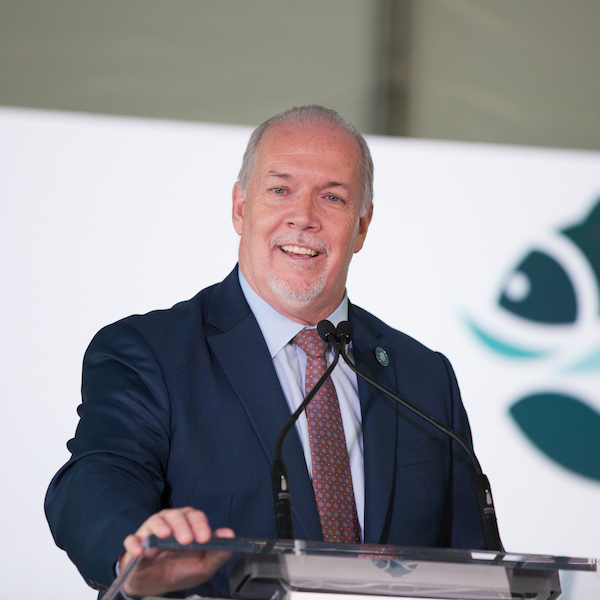Sea change coming for aquaculture in Canada
Federal and B.C. governments outline road map for the future of the aquaculture industry as International Year of the Salmon kicks off
By Fabian Dawson
SeaWestNews
Canada will adopt an area-based management approach to aquaculture that would include identifying appropriate geographic sites for fish farms and maximum densities, Federal Fisheries Minister Jonathan Wilkinson has announced.
The government is also embarking on an economic technology feasibility status study for closed containment aquaculture, said Wilkinson, at the launch of the International Year of the Salmon in Vancouver yesterday.
“In the coming weeks and months you will see more on wild salmon and on issues impacting wild salmon including, aquaculture,” said Wilkinson.
“We are working to ensure that aquaculture practices consider, assess and mitigate impacts on the environment, taking action on this front with partners to adopt an area-based management approach for aquaculture.”
The government, he said is also updating its risk-management framework for aquaculture, “which will embody a clear understanding of unacceptable harm, embrace precautionary approaches where uncertainty exists, and will fully engage the public and Indigenous Peoples.”
As part of the launch of the International Year of the Salmon, Wilkinson introduced the Government of Canada’s Wild Salmon Policy 2018-2022 Implementation Plan.
This five-year plan outlines concrete actions the Department of Fisheries and Oceans will take to help rebuild Pacific wild salmon populations and their habitats.
“Our government will continue to protect this species, which has such cultural, social and economic significance for Canadians. Today, as we launch the International Year of the Salmon, I invite all Canadians to work together to help us protect the health and biological diversity of salmon populations in Canada, beginning here in B.C. Together, we can help rebuild these stocks for the benefit of our entire ecosystem, and for generations to come.”
“Area-based management strategies are part and parcel of our industry,” said John Paul Fraser, executive director of the B.C. Salmon Farmers Association.
“As farmers in our ocean we are passionate about wild salmon and have a duty to be part of the solution to the challenges they are facing,” he said.
Fraser said B.C.’s salmon farmers always have and always will welcome industry- and policy-relevant science advice and tools for more effective area-based management of salmon aquaculture.
“The reality is science tells us wild and farm fish populations can co-exist in the ocean, and we know that salmon farming plays a crucial role in protecting wild fish by providing a sustainable alternative.”
Farm-raised salmon is B.C.’s highest valued seafood product, the province’s top agricultural export, and generates over $1.5-billion towards the B.C. economy, resulting in over 6,600 jobs.
Today, B.C.’s salmon farmers raise almost three-quarters of the salmon harvested in the province each year on about 0.05 per cent of the coast.
But salmon farming remains a contentious issue in some First Nation communities in BC, especially in the Broughton Area off Vancouver Island.
Bob Chamberlin, vice-president of the Union of BC Indian Chiefs, said the Kwikwasut’inuxw Haxwa’mis First Nation council has been working on a transition plan for the salmon farming operations in the Broughton Archipelago.
“We feel confident that with the support of the provincial government and the federal government that we’ll be able to arrive at a set of recommendations for an agreed-upon transition plan for the industry,” he said.
The B.C. government, in conjunction with the launch of the International Year of the Salmon released its Wild Salmon Advisory Council report which provides 14 recommendations that support the health, habitat and management of wild salmon, as well as the sustainability of the wild salmon industry in the province.
“These recommendations will help B.C. protect and enhance wild salmon for future generations,” said Premier John Horgan (pictured).
It will be submitted to the legislative assembly’s Select Standing Committee of Agriculture, Fish and Food in the coming weeks. The committee has been tasked with leading a public consultation process with British Columbians on the advisory council’s report in the new year, which will inform the development of a renewed provincial approach to protecting wild salmon.
“The report details the important role wild salmon play in B.C.’s ecosystem and economy,” said Lana Popham, Minister of Agriculture.
“As we enter the International Year of the Salmon, we are committed to working in partnership with the federal government to help restore and sustain B.C.’s salmon population,” she said.
The International Year of the Salmon is an initiative to inform and stimulate outreach and research that aspires to establish the conditions necessary to ensure the resilience of salmon and people throughout the Northern Hemisphere.
RELATED LINKS
The International Year of the Salmon
Wild Salmon Advisory Council report
First Nations communities benefit from aquaculture
Salmon sleuths on the hunt for “likely suspects”

